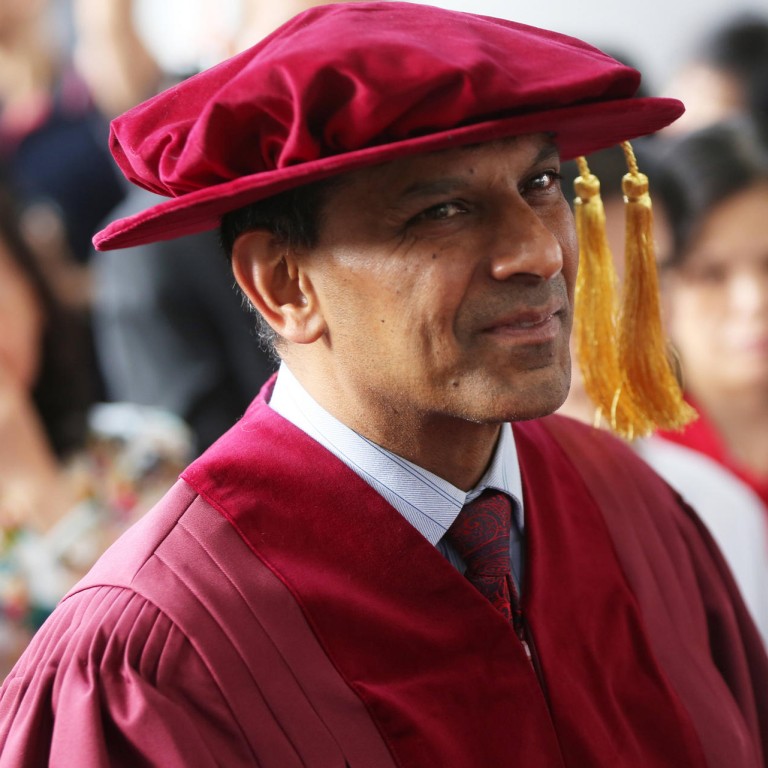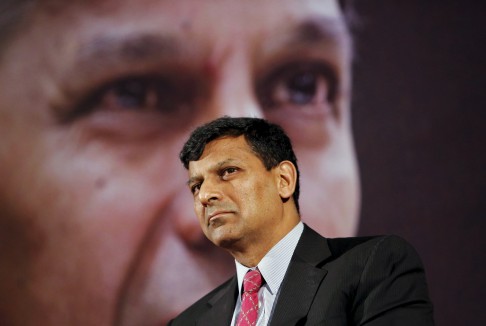
Exclusive | China's pain is India's pain too, says India's 'rockstar' central bank governor
Celebrated central bank governor says slowdown hurting India as he points to growing interdependence between two Asian giants
China's pain is India's pain too, says its central bank governor, contradicting the country's finance minister who recently said India will not be affected by China's slowdown.
"The Chinese slowdown is a concern for the whole world. There is lower demand for some of our exports to China. But indirectly too, many of the countries are not exporting to China as much as they did and they are buying less from us," said Reserve Bank of India governor Raghuram Rajan in an interview with the on Friday.
"But India being a commodity importer, has been helped a bit by cheaper commodities. So the impact hasn't been as bad as it could have been. Still, on the whole, we have been adversely affected by the Chinese slowdown because China's slowdown has impacted global growth and India is very well integrated into the global economy."
India's Finance Minister Arun Jaitley last month told a gathering at Columbia University that India is "not impacted" by the slowdown as "we are not a part of the Chinese supply chain", adding that India could, in fact, become the "additional shoulder" the global economy needs to stand on as China slows.
READ MORE: China market turmoil proves a blessing for India
Jaitley thus joined some of the other leading lights in India - which fought a war with China in 1962 over an unresolved border - who have suggested the chill in rival China may be an opportunity for India, triggering fiery commentary in Chinese state media.
A recent opinion piece headlined "China's economic pain can't be India's gain" in state-run said: " 'China's pain is India's gain' is a political slogan to buoy up the Indian public" at a time when the Narendra Modi government is facing several challenges.
"India should understand that without a proper environment … its ambition to be a world economic engine is merely a dream," it said.
READ MORE: India's central bank chief says China not to blame for Asian currency war, backs bigger role for yuan
Pointing to "growing interdependence" between India and China, the 52-year-old central banker, whose star power in India rivals that of Bollywood heroes, said China occupies a special place in India's economic drive.
"The prime minister has clearly laid out a path for improving relations with neighbours. The focus is on the East, rather than the traditional emphasis on the West. Whether it is through the Asian Infrastructure Investment Bank or through China's Silk Road initiative, we will have greater engagement with China and Chinese projects. This will also feed well into China's interests in expanding its engagement in the region."
While Modi's "Make in India" campaign to attract global manufacturers is bringing in more foreign investment and has pushed India up in global competitiveness rankings, much of the credit for the rising confidence in India goes to Rajan, who was one of the few economists who had predicted the 2008 financial crisis.
READ MORE: India’s central bank keeps interest rates unchanged
An electrical engineer from the Indian Institute of Technology in Delhi, Rajan took an MBA degree from the hallowed Indian Institute of Management Ahmedabad before going on to do his PhD from the Massachusetts Institute of Technology. At 40, he was the youngest ever IMF chief economist.
After taking over as central bank governor in September 2013, Rajan's unwavering focus on keeping inflation in check helped the Indian rupee to recover from a record low and raise India's foreign-exchange reserves to record levels. But his insistence on keeping the interest rate high has put him at loggerheads with the government, which wants to boost growth by cutting rates.
But his conservative policy, and the relative stability it has provided the rupee, has impressed foreign investors, with brokerage CLSA last week calling him an "important piece in the jigsaw puzzle of India's sustained and successful economic rise" and even an India-sceptic like billionaire investor Jim Rogers calling him "the least bad central banker in the world".
According to Bloomberg, global funds have increased their holdings of rupee-denominated bonds by US$8.5 billion this year, with India's 10-year sovereign notes yielding 541 basis points more than similar-maturity US Treasuries.

Citing unnamed sources, the paper said the PBOC invested about US$500 million in bonds, making it the biggest buyer among other central banks like Malaysia, Indonesia and Norway, which have also recently piled into Indian government bonds.
Rajan said he hopes India will emulate China's growth rates and the country would like to learn from things China got right.
"We would like to learn from its manufacturing success, how it built up its infrastructure, how it encouraged its village enterprises and how it manages FDIs in such enormous quantities. A lot of Indian businesspeople who travel to China also keep coming back with stories of why it works better than India," he said.
"But I also stress we cannot blindly follow the path that China followed as it has already been on that path and has changed some of the conditions. We have to determine which path we follow so that there is room for both of us. Would it, for example, make sense for India to specialise in industries that China has already specialised in? In some cases there is room for both, in some maybe not."

